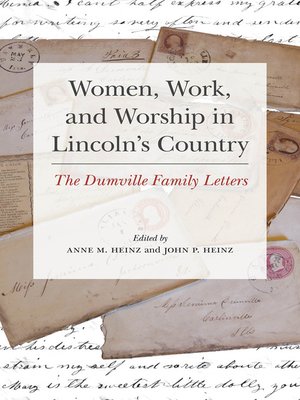
Sign up to save your library
With an OverDrive account, you can save your favorite libraries for at-a-glance information about availability. Find out more about OverDrive accounts.
Find this title in Libby, the library reading app by OverDrive.



Search for a digital library with this title
Title found at these libraries:
| Library Name | Distance |
|---|---|
| Loading... |
The Dumville family settled in central Illinois during an era of division and dramatic change. Arguments over slavery raged. Railroads and circuit-riding preachers brought the wider world to the prairie. Irish and German immigrants flooded towns and churches. Anne M. Heinz and John P. Heinz draw from an extraordinary archive at the Abraham Lincoln Presidential Library and Museum to reveal how Ann Dumville and her daughters Jemima, Hephzibah, and Elizabeth lived these times. The letters tell the story of Ann, expelled from her Methodist church for her unshakable abolitionist beliefs; the serious and religious Jemima, a schoolteacher who started each school day with prayer; Elizabeth, enduring hard work as a farmer's wife, far away from the others; and Hephzibah, observing human folly and her own marriage prospects with the same wicked wit. Though separated by circumstances, the Dumvilles deeply engaged one another with their differing views on Methodism, politics, education, technological innovation, and relationships with employers. At the same time, the letters offer a rarely seen look at antebellum working women confronting privation, scarce opportunities, and the horrors of civil war with unwavering courage and faith.|
Cover
Title
Copyright
Contents
Preface: The Provenance and Transcription of the Letters
Acknowledgments
1. The Dumvilles and Their Times
2. 1851–1853 Family Matters
3. 1854–1855 Cholera
4. 1856–1857 Political Awarenes
5. 1858–1860 The Lincoln-Douglas Elections
6. 1861–1863 The War
7. The Letters End
Notes
References
Index
|"A wonderful achievement consisting of a trove of letters from a family living plain lives in central Illinois in the middle of the nineteenth century. Plain lives? Very many deaths from cholera and measles and other means, family strains, feuds, the moral rigor of the Methodist Church, and then the war came. People wear out. There's material here for a dozen novels: 'Mr. Pitner was turned out of the church in March, for selling men and women into perpetual bondage, as the people said. He takes it very hard, he says he has had a great deal of trouble, and we know he has for his sister was burned to death, and his two sons was drowned just at the time they began to be of some service to him but he says that this afaire hurts him worse than all the others, as he knows he is innocent of the charges brought against him. . .'"—Ward Just
"Meticulously edited, the Dumville family letters vividly evoke everyday life for ordinary women in mid-19th century rural America. As the writers describe their hopes, dreams, and fates, this unique archive lets us hear voices that are often silenced, neglected or simply lost."—Robert Dingwall, chair of the American Sociological Association ™s Section on Ethnomethodology and Conversation Analysis
"A very useful discussion of women's place in rural Midwestern communities; the impact of the Civil War on family life; and the texture of life in these small, central Illinois towns. I don't know of any other collection quite like it."—Pamela Riney-Kehrberg, author of Always Plenty to Do: Growing Up on a Farm in the Long Ago
|Anne M. Heinz is the former Assistant Dean of the Division of the Social Sciences at the University of Chicago and the coauthor of Crime and City Politics. John P. Heinz is the former Director of the American Bar Foundation and Owen L. Coon Professor Emeritus at the Northwestern University School of Law. He is the coauthor of Urban Lawyers: The New Social Structure of the Bar.
"Meticulously edited, the Dumville family letters vividly evoke everyday life for ordinary women in mid-19th century rural America. As the writers describe their hopes, dreams, and fates, this unique archive lets us hear voices that are often silenced, neglected or simply lost."—Robert Dingwall, chair of the American Sociological Association ™s Section on Ethnomethodology and Conversation Analysis
"A very useful discussion of women's place in rural Midwestern communities; the impact of the Civil War on family life; and the texture of life in these small, central Illinois towns. I don't know of any other collection quite like it."—Pamela Riney-Kehrberg, author of Always Plenty to Do: Growing Up on a Farm in the Long Ago
|Anne M. Heinz is the former Assistant Dean of the Division of the Social Sciences at the University of Chicago and the coauthor of Crime and City Politics. John P. Heinz is the former Director of the American Bar Foundation and Owen L. Coon Professor Emeritus at the Northwestern University School of Law. He is the coauthor of Urban Lawyers: The New Social Structure of the Bar.







